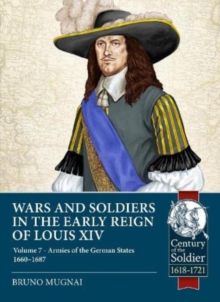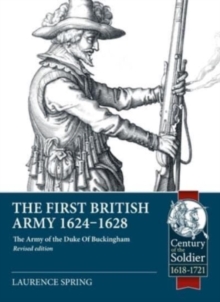
No Armour but Courage : Colonel Sir George Lisle 1615-1648 Paperback / softback
by Serena Jones
Part of the Century of the Soldier series
Paperback / softback
Description
Few army officers of King Charles I shone as bright as George Lisle during the English Civil Wars, yet have drawn so little attention from subsequent historians.
Born in London in 1615, Lisle's father was a well-connected publisher and monopolist, and his mother a kinswoman of the Duke of Buckingham.
Raised in the city of Westminster in a landscape of court intrigue, royal favouritism and ill-advised royal financial experiments, Lisle took to soldiering and was commissioned as a Lieutenant-Colonel at the outbreak of war in 1642.
He fought at Edgehill; then at Chalgrove and the First Battle of Newbury in 1643 - latterly where his courage in leading a forlorn hope against a wall of musketeers and artillery first drew him to public attention.
Commissioned shortly afterwards as a full Colonel, in 1644 he took charge of a veteran regiment and was noticed again for his diligence and efficiency at the Battle of Cheriton, despite the battle being lost.
Weeks later, he was promoted to tertio command and accompanied Charles on his critical 'night march' from Oxford.
At the Second Battle of Newbury in October, to prevent his position being overwhelmed, he famously tore off his coat and led three charges in his shirtsleeves - driving off the enemy and preventing disaster.
Reputedly refusing a knighthood, he wintered as a garrison commander before leading the principal assault on the city of Leicester in May 1645 and then being badly wounded at Naseby.
Knighted in December, he remained at Oxford until its surrender in June 1646 - returning to London in 1647.
In 1648, he took up arms again during the Kent rebellion before enduring a three-month siege inside the town of Colchester.
Infamously (and controversially), he was executed after the starving town surrendered - and this catapulted him to the status of 'Royalist martyr'. In this first ever biography of Lisle, the author has scoured dozens of primary sources for fragmentary references - painstakingly piecing together his personal background and re-examining every known detail of his career.
The accuracy of existing stories and long-held assumptions about him is investigated minutely, and the first well-informed assessments made of his character and motives.
Finally, the persistent memory of his execution is traced forwards through later writers and painters into the 20th century to complete the first cohesive picture of one of King Charles' most loyal, effective and respected military officers.
Information
-
Out of stock
- Format:Paperback / softback
- Pages:408 pages, 10 photos, 11 ills
- Publisher:Helion & Company
- Publication Date:05/08/2021
- Category:
- ISBN:9781914059575
Other Formats
- Hardback from £21.15
Information
-
Out of stock
- Format:Paperback / softback
- Pages:408 pages, 10 photos, 11 ills
- Publisher:Helion & Company
- Publication Date:05/08/2021
- Category:
- ISBN:9781914059575










